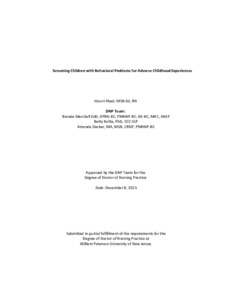Please use this identifier to cite or link to this item:
http://hdl.handle.net/20.500.12164/3334Full metadata record
| DC Field | Value | Language |
|---|---|---|
| dc.contributor.author | Abad, VaLori Rochele | - |
| dc.date.accessioned | 2024-01-22T20:53:55Z | - |
| dc.date.available | 2024-01-22T20:53:55Z | - |
| dc.date.issued | 2023-12-08 | - |
| dc.identifier.uri | http://hdl.handle.net/20.500.12164/3334 | - |
| dc.description.abstract | Background: Adverse Childhood Experiences (ACEs) includes events such as neglect, witnessing or experiencing emotional, physical abuse, or sexual misconduct, and living in a household with parental divorce or separation, household member incarceration, or a parent with serious mental illness or substance use disorder. Problem: Recurrent trauma exposure between birth and age eighteen can have lasting harmful effects on the developing brain. ACEs have been associated with long-term, negative social outcomes as well as physical and mental illness in adults, including increased risks for mental illness, substance misuse, and fatal conditions, such as cancer, diabetes, heart disease, and suicide. Purpose: The purpose of this DNP project was to identify the level of provider awareness of ACEs and the use of the ACEs tool. Method: This project utilized a descriptive, cross-sectional, non-experimental design through the collection of quantitative data via a Qualtrics online survey tool. Results: Data from 75 surveys were analyzed. The majority of the participants were female (75%) who ranged in age from twenty-eight years to sixty-eight years. 40% were Registered Nurses, in practice between one year and forty-nine years. 59% of the participants were extremely familiar with the term ACEs. 79% of respondents use an ACEs screening tool for every child, during every visit 32% of the time. Most screenings (40%) are administered to the child and parent/guardian, together. Nearly 60% of respondents use a screening tool to determine the need for further referral, assessment, and/or treatment. Implications for Practice: Implementation of an ACEs screening tool could improve health outcomes and mitigate the risk of premature death through early intervention and disease recognition. | en_US |
| dc.format.extent | 43 pages | en_US |
| dc.language.iso | en_US | en_US |
| dc.publisher | William Paterson University | en_US |
| dc.subject | Adverse childhood experiences | en_US |
| dc.subject | Early intervention | en_US |
| dc.subject | Screening | en_US |
| dc.subject | Trauma-informed care | en_US |
| dc.subject | Nursing | en_US |
| dc.subject.lcsh | Nursing | en_US |
| dc.title | Screening Children with Behavioral Problems for Adverse Childhood Experiences | en_US |
| dc.type | Dissertation | en_US |
| Appears in Collections: | Theses & Dissertations | |
Files in This Item:
| File | Description | Size | Format | |
|---|---|---|---|---|
| Abad_ScreeningAdverseChildhoodExperiences.pdf | 967.81 kB | Adobe PDF |  View/Open |
Items in DSpace are protected by copyright, with all rights reserved, unless otherwise indicated.
